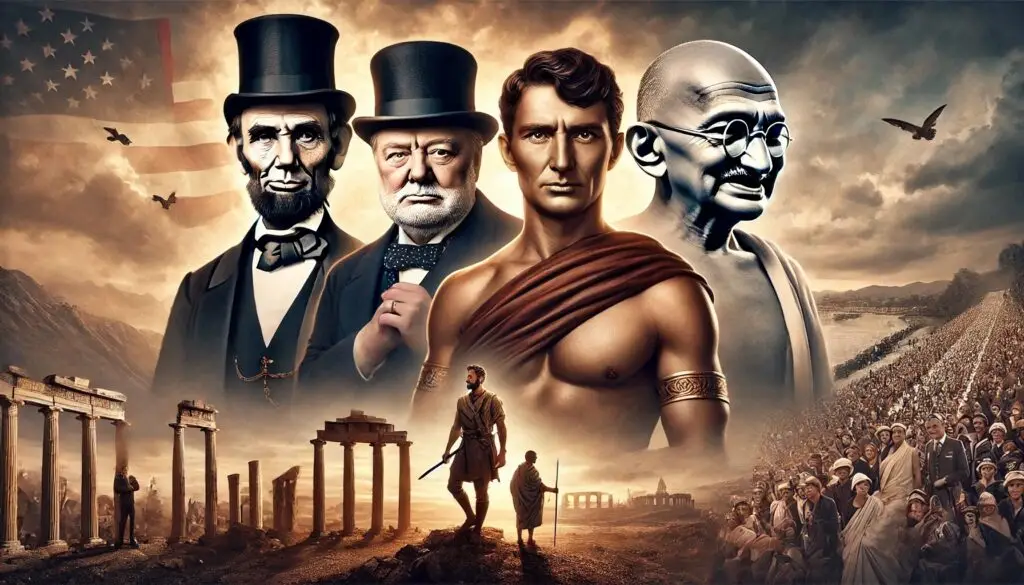In today’s fast-paced world, change is a constant challenge. Leaders everywhere—from CEOs guiding companies through digital transformations to team leads helping employees navigate new workflows—face the tough task of keeping people motivated and focused amid uncertainty. But leading through change is not a new challenge. History is full of figures who not only navigated change but inspired entire nations, armies, and movements along the way. By examining their stories, modern leaders can learn practical lessons on how to keep their teams resilient, adaptable, and united, even when the future is unclear.
Historical Figures Who Exemplified Leadership During Change
History offers us inspiring examples of leaders who triumphed in uncertain times. Their ability to stay resilient, communicate effectively, and inspire others provides valuable lessons for leaders today.
- Winston Churchill – Resilience in Crisis
When Britain faced its darkest hours in WWII, Prime Minister Winston Churchill’s ability to instill hope and strength in people was crucial. Known for his stirring speeches, Churchill kept spirits high, showing resilience in the face of unthinkable pressure. His steadfast resolve and ability to inspire confidence remind us of the power of staying strong and visible during crises. Leaders today can draw from his example by fostering an atmosphere of resilience, even when challenges seem overwhelming. - Abraham Lincoln – Leading Through Division
During the U.S. Civil War, President Abraham Lincoln showed how empathy and vision can help leaders unite divided groups. Despite fierce opposition and immense national strain, Lincoln pursued unity, building a “team of rivals” that encouraged collaboration among differing perspectives. This approach helped heal divisions and brought about lasting change. Leaders can take away the importance of empathy and the courage to pursue a unifying vision, even when faced with conflicting viewpoints. - Mahatma Gandhi – Inspiring Change Through Nonviolence
As a leader of India’s independence movement, Mahatma Gandhi embodied the power of peaceful resistance. Through nonviolence, he united millions to work toward a common goal, even when progress was slow and resistance was fierce. His dedication to a peaceful vision and ability to inspire loyalty made him a leader for the ages. Modern leaders can learn from Gandhi’s patience and vision, understanding that achieving long-term goals often requires dedication and the ability to inspire others to stay the course. - Alexander the Great – Strategic Vision in Uncharted Territories
Alexander the Great’s conquests into unfamiliar lands showed how leaders can adapt and learn from new situations. Rather than imposing his own ways, he often adopted elements from the cultures he encountered, which helped him maintain order in newly conquered regions. His adaptability highlights the importance of open-mindedness and learning from one’s environment. Today’s leaders, particularly those in global or diverse teams, can benefit from this flexibility and cultural awareness.
Key Leadership Qualities for Navigating Change
From these historical figures, we can identify key leadership qualities that are just as relevant today:
- Resilience: Churchill’s resilience shows that staying strong and determined, even when outcomes are uncertain, can inspire others to follow suit.
- Adaptability: Alexander’s willingness to adjust to new cultures and adopt what worked underscores the value of flexibility in leadership.
- Empathy and Unity: Lincoln’s approach illustrates the power of empathy in bringing people together and creating a collaborative team.
- Vision: Gandhi’s unwavering dedication to peaceful resistance reminds us that a clear vision, grounded in purpose, can rally people behind even the most challenging goals.
Modern Leadership Insights on Navigating Change
Bringing these historical qualities into the modern workplace, today’s leaders must tackle challenges ranging from technological shifts to changing workforce dynamics. Here’s how these insights translate to today’s context:
- Communication and Transparency: In times of change, leaders should communicate openly, much like Churchill did during WWII. A clear and transparent message builds trust and keeps people aligned, even if all the answers aren’t available yet.
- Encouraging Diversity of Thought: Following Lincoln’s example, leaders can create “teams of rivals” to welcome a diversity of perspectives. This helps make well-rounded decisions and prepares the team to navigate complex challenges.
- Building a Culture of Resilience: Cultivating a team-wide mindset of resilience and adaptability—qualities seen in all these historical figures—ensures that the entire team can handle changes together rather than leaving it all up to one leader.
- Resource Recommendation: Leaders Eat Last by Simon Sinek provides practical insights on fostering trust and resilience within teams, which are especially valuable during times of change.
Actionable Tips for Leaders Today
To put these lessons into action, here are a few practical tips for modern leaders:
- Communicate a Clear Vision: When things get uncertain, reminding the team of a shared purpose or long-term goal, as Gandhi did, can keep morale high.
- Foster a Collaborative Environment: Like Lincoln’s team of rivals, encourage open discussions and allow different viewpoints to shape the decision-making process.
- Stay Grounded and Patient: Achieving long-term goals requires patience. Leaders can take inspiration from Gandhi’s endurance, remaining steady even when success is gradual.
- Embrace Adaptability: Be open to new approaches and feedback, as Alexander was when navigating new lands. This adaptability is especially valuable in a rapidly changing world.
Conclusion: Drawing Strength from the Past to Shape the Future
While change can be daunting, leaders who embrace qualities like resilience, adaptability, empathy, and vision can guide their teams through even the most uncertain times. By looking to the examples of history’s great leaders, modern leaders can find valuable tools and strategies to help their teams navigate change with confidence. After all, the qualities that empowered Churchill, Lincoln, Gandhi, and Alexander in their times are the same qualities that can empower today’s leaders to inspire and lead effectively.
References
1.Winston Churchill – Resilience in Crisis
“Churchill’s Character: Hardiness, Resilience and Personal Toughness” – Hillsdale College
https://winstonchurchill.hillsdale.edu/churchill-character-hardiness/
2.Abraham Lincoln – Leading Through Division
Team of Rivals: The Political Genius of Abraham Lincoln by Doris Kearns Goodwin
https://books.google.com/books/about/Team_of_Rivals.html?id=ONhhui9SRsMC
3.Mahatma Gandhi – Inspiring Change Through Nonviolence
“Gandhi’s Philosophy of Nonviolence” – Stanford University
https://plato.stanford.edu/entries/gandhi/#Nonv
4.Alexander the Great – Strategic Vision in Uncharted Territories
“Alexander the Great: Leadership Lessons” – Harvard Business Review
https://hbr.org/2017/05/leadership-lessons-from-alexander-the-great
5.Modern Leadership Insights
Leaders Eat Last by Simon Sinek
https://simonsinek.com/product/leaders-eat-last/
These sources provide further insights into the leadership qualities and strategies discussed in this blog post.





